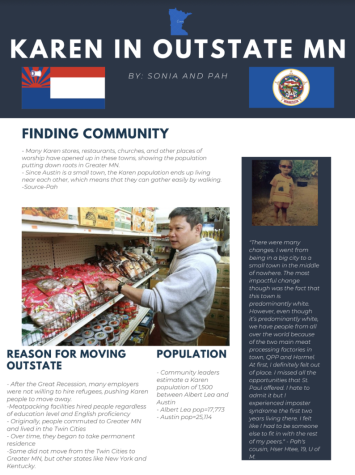The Language Learning Process: Ep. 5 Language Spoken at Home – Karen
Elle Chen: [INTRO] Welcome to the fifth installment of the Language Learning Podcast. I’m your host, Elle Chen, and today we will be hearing from senior Pah Na about learning Karen as his first language.
Pah Na: My name is Pah Na. [Introduction in Karen]
Chen: Could you talk a little about how you learned Karen?
Na: Karen was my first language because I was born in Thailand near the border of Myanmar, and it’s my first language so I grew up speaking it. Then I moved to the U.S. when I was four and I started learning English after that. I quickly became fluent in English because I was learning it pretty young but I’ve been able to remember Karen pretty well. I feel like I’m pretty proficient, and it’s hard because some families come and then the kids end up only speaking English. So, I think this happens to a lot of other cultures that move to the U.S. but once they integrate themselves into American society, sometimes they don’t speak Karen anymore.
Chen: Since Karen was your first language, did your parents ever give you additional lessons or make you take classes?
Na: Yeah, it was just a natural language learning type of situation because I don’t know how to write in Karen and my parents have brought up the idea of going to learn to write as well as be more proficient in speaking but I’ve just never done that. Even my aunt’s offered to teach me in the summers but I’ve yet to do that. I think my youngest brother might need to do something like that because when he was younger, he spoke a lot of Karen, but now that he’s gone to school, he’s been forgetting Karen and just speaking English.
Chen: What is one thing that you find the most difficult about Karen?
Na: Characters where there’s a lot of same words with different tones and they have different meanings. So the example that I always talk about is “ji” which means money and then “ji” which is coat hanger and then “je” which is like tight and then there’s like three more and then “ji” is left. Otherwise, each word is a syllable.
Chen: What would you say are some of the biggest differences between Karen and English words or phrases?
Na: I don’t know how this works in other languages but some words can have a meaning. One syllable has a meaning and this other syllable by itself has a different meaning, and you put them together and it has a whole different meaning. Like, they somehow mix and make something else so it makes sense. So it’s like “htee” is water, “klaw” is like boil, so “htee klaw” is like boiled water. I guess it’s more complex. I don’t know how the writing works but the writing looks more complex and some words don’t directly translate to English. And we actually have some that come from English like phone is “pho,” like just “pho.”

Chen: Do you think in both English and Karen? Do they ever get mixed up in your head?
Na: I think in English unless I’m in a situation where I might not want to speak English so I’m thinking in Karen and I can quickly speak in Karen. Like sometimes, I’m in the car and I’m like “shoot.” I make the realization that I don’t want to lose my language so then I’m like I need to practice so I start thinking in Karen in order to practice. It sounds kind of dumb but yeah, I think in English.
Chen: Do you have a favorite phrase in Karen or know a phrase that can’t be translated to English?
Na: Like my nickname is “Ta kee koh.” So the way that it directly translates is curly head because I used to have really curly hair. So in English, it doesn’t sound exactly right but certain words in Karen just refer to a certain person like a being. So “koh” means head but in the context of it, it means person so “Ta kee koh” doesn’t just mean curly head, it means some being with curly hair.
Chen: And if there’s one thing you’d like listeners to take away from today’s podcast, what would it be?
Na: My fact is that there are a tone of different dialects of Karen. So from village to village, there’ll be different variations of Karen and there are a couple main ones so there’s Karen and Pwo Karen which, to me, is like Karen but cursive. I can rarely understand it sometimes, but I can’t speak it. It’s got a couple of similarities but mostly it’s different.
Chen: [Outro] Thank you for listening. Once again, I’m Elle Chen and this has been the Language Learning Podcast.
Elle Chen (she/her) is a co-Director of RubicOnline. This is her fourth year on staff. Over the summer, Elle interned at NSPA to help plan journalism conventions,...